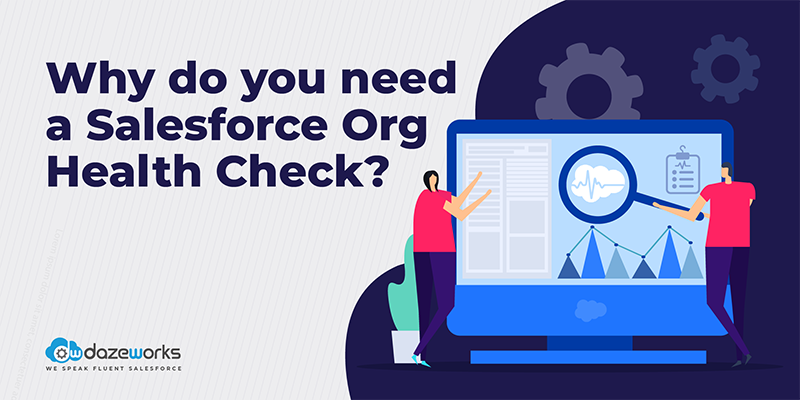
Why do you need a Salesforce Org Health Check?
minutes read
Salesforce is undoubtedly the most robust and secure cloud platform that gives your business organization the ability to grow tenfold in terms of ROI and customer experience. But can this ROI be fully achieved if your Salesforce org is not well taken care of and optimized from time to time? Also with Salesforce releasing three updates in a year, it is vital to keep your Salesforce environment ready and attuned to the changes. This is where a regular and periodic Salesforce health check helps.
Why is Salesforce health check important?
It may not be apparent to you in the beginning, as you are so accustomed to Salesforce like a good old friend without any issues. But it can be lurking around the corner and you may not even notice how it began to affect your organization, until you see a decrease in the performance of your team or in expected returns. Security settings, licenses and other unique features you turned a blind eye to can create problems without giving away any hints in the beginning. Periodic health checks help in optimizing your Salesforce platform in tune with your business progress without leading to a complete overhaul of your system.
With Salesforce Health Check you can :
- Maximise Salesforce Org efficiency and improve ROI
- Get a clear picture of your Salesforce org’s current security systems
- Improve user adoption and productivity of sales teams
- Achieve faster technology deployments
So how do you analyse whether your Salesforce org needs a visit to the doctor?
Here are some tell-tale symptoms:
Your Salesforce org was implemented a long time ago
You were head over heels for Salesforce a long time ago, for the way it’s flexible and customized to your business, but is it still the same now? Has something changed over the course of time? How aligned is your implementation with your current market transformations, business processes and objectives? Perhaps you require a tweak here and there, or you’ve completely outgrown the current Salesforce environment and need a massive change to the entire system.
You have a messy org
Is your Salesforce data a complete mess? According to a report, 58 % of users claim their data is not usable/reliable. Ofcourse, no Salesforce org is pristine but if your CRM is exploding with duplicate data which kills the overall efficiency you expect from your team, you should be prepared for a trip to the Salesforce doc.
Your team is moving away from Salesforce
Are you still struggling with user adoption? In fact, less than 37% of sales reps actually use their company’s CRM system for customer service (CSO insights). Perhaps this happened because the system when initially designed was not really made considering the interests from the end- users. Or a less interesting UI with unnecessary fields may be confusing your team. In this case, it’s best to revisit your implementation and consider a tune- up partnering with an expert.
You are facing data storage limitations
Did you just hit the Salesforce storage limit or are you running out of it? Yes there has been a huge increase in the Salesforce storage limit from 1 GB to 10 GB with Salesforce’s Spring 2019 release, but you still need to be careful about the data you decide to store. When you keep piling up data that is actually not required in your Salesforce org, it results in a number of issues such as decrease in performance and inefficient reports which do not portray the current state of business. You may even notice how your team is slowly getting frustrated about checkin old records and irrelevant data to finally dig out what they are looking for.
Now that you have identified your symptoms, the next step is to go to a Salesforce expert doc who can diagnose your problem and curate the right remedy. Meanwhile, do keep in mind these Salesforce tools which can come in handy while conducting the health check.
- Salesforce health checker
- Apex PMD tool
- Checkmarx Apex Code Scanner
- Salesforce Accelerators
Now who is a Salesforce doc? It can be Salesforce Administrators, Salesforce Developers, Salesforce consultants or even experienced Salesforce users. Our suggestion would be to get in touch with an experienced consultant who knows all the nitty gritty details regarding Salesforce. You’ll get some great advice from the team, regardless of where your Salesforce org is placed right now.
Interested? Talk to an exclusive consultant to explore our full suite of Salesforce health check services.
